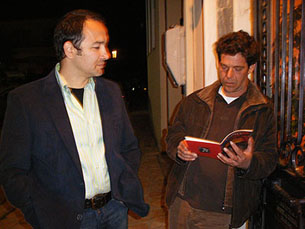| |
|
forkis - ithaki theatre group |
|
|
Ithakis Theatre Group, Forkis, last night presented, Yerma, a play by the Spanish dramatist Federico García Lorca . It was written in 1934 , and first performed that same year. Lorca describes the play as "a tragic poem." The auditorium was less than half full, but those with the spirit of theatre, who ventured out from behind the TV and the football game, experienced a truly enlightening performance. Wow! It was excellent from every aspect. From the directing of
Eleni Karabetsou to the simple, but very moving music of drums and flute pipe, the understated and moody lighting and the extraordinary performances of the entire cast. Congratulations to all involved. This presentation of Yerma proved to me at least, that Ithaki is just brimming with talent which we are all lucky to have amongst us through the insight and dedication of Forkis leaders who venture beyond this rock to open up our cultural universe. |
|
|
|
|
|
|
|
|
Information taken from Wikipedia/Spain. Thank you to Ioanna Forkis cast member for supplying it. |
|
|
|
|
Far Left - Xaroula, Ithaki actress with one of the demanding roles of Yerma with Alexandros Taflambas, one of the heads of Forkis and cast member. Left - Eleni Karabetsou, well respected Director. |
Yerma - The story of a childless woman living in rural Spain. Yermas desperate desire for motherhood becomes an obsession that eventually drives her to commit a horrific crime. This desperation is produced by the social norms of her culture, and the work functions as a critique of those norms. Living in a society of women who have children with their husbands as part of a ritual, this hurts Yerma even more. Yerma kills her husband in the end because he is a frugal, economically driven man who has no desire to have children. For him, children are a costly transaction. The ending where she kills him is ironic however because she kills him at "Ermita" which is a religious place with the possibility of fertility.
|
|
|
|
|
|
Yerma deals with isolation, passion and frustration |
|
|
 |
Yerma is the story of a woman slowly driven mad by her inability to understand why she cannot conceive a child. Married to a man she doesn't love and in a love with a man who, despite feeling the same way, is unwilling to break the rules of the village and run away with her, Yerma lives a loveless and miserable existence. Lorca's play is a dark and tragic story. Whilst undoubtedly a comment on many issues including Organised Religion and the role of women, Lorca's play is at its greatest when considered as a character study of three very lonely people. |
|
|
|
|
|
|
|
| Lorca raises the question of women's social status - a controversial question both then and now |
|
|
|
|
|
|
|
|
|
|
|
|
|
|